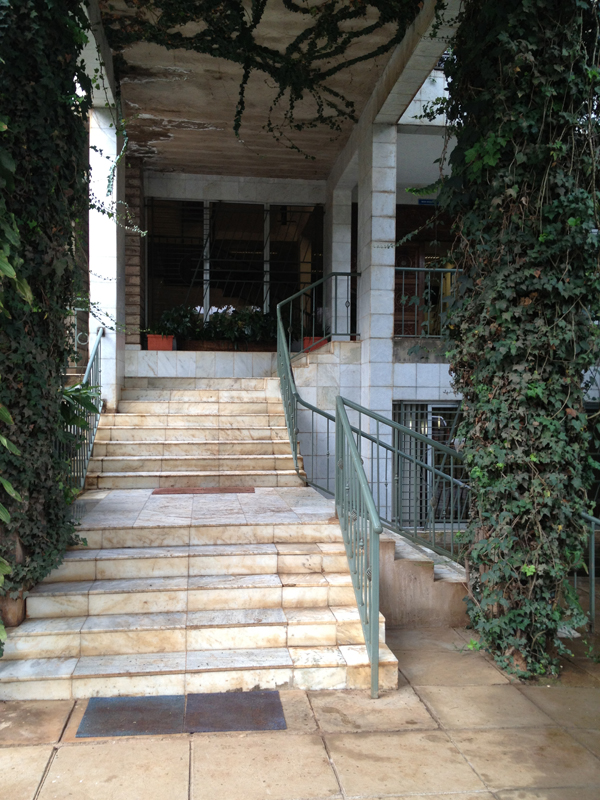Nervous in Nairobi
In Nairobi, the situation was tense. Radio communication with Baidoa had been lost early in the raid. Occasional emails got through, sent by national staff, but the Somalis had been separated from the international staff early on and had little firsthand information about the negotiations. Bowden himself was out of the country, his duties falling to Rozanne Chorlton, the UNICEF representative to Somalia, who had arrived just months earlier from Liberia. Baidoa wasn’t her only problem that day. Al-Shabaab had staged a second morning raid on the WFP compound in Wajid, 55 miles northwest of Baidoa, and sensitive negotiations were underway over the fate of the three NGO workers kidnapped the day before in Mandera.

OCHA Nairobi offices
Information out of Baidoa was fragmentary and conflicting. Nairobi didn’t know how many commandos were involved, whether and which vehicles had been seized, or what al-Shabaab’s intentions were toward the UN’s local NGO partners. Chorlton had reports of Al-Shabaab’s letters of expulsion, and a longer communiqué was beginning to make the rounds on Somali radio stations. The communiqué announced the creation of a new Shabaab “office for supervising the affairs of foreign agencies” in regions the insurgents controlled. All NGOs and foreign agencies were to report to the new office immediately to be “informed of the conditions and restrictions on their work and on how their work may continue.” The communique continued:
Any NGO or foreign agency found to be working with an agenda against the Somali Muslim population and/or against the establishment of an Islamic State will be immediately closed and dealt with according to the evidence found. [22]
Further details were not yet available.
In late afternoon on July 20, the Nairobi-based NGO Safety Programme (NSP), run by the Somalia NGO Consortium, issued an advisory on the raid to its members. Titled “Uncertainty in Baidoa,” the advisory noted an increasing climate of hostility toward international organizations and cited reports of al-Shabaab’s recent beheading of seven accused spies, its suspected involvement in the Mandera kidnappings, and the deployment of local Shabaab militia to fight against the TFG in Mogadishu. [23] NSP advised humanitarian aid agencies to consider “temporary hibernation of operations” in Baidoa, and to take measures to safeguard their staff, assets and operations in the surrounding area. [24]
Suspension . That same afternoon, Chorlton announced the temporary suspension of all UN operations in Baidoa, calling it a “difficult decision” and expressing hope that the suspension would be “very short term.” [25] The UN in Nairobi issued a press statement which cited two reasons for the suspension: the loss of emergency communications equipment and the departure of security officers. [26] The announcement came in time for the regular noon briefing from the secretary-general at UN headquarters in New York (there was a 7-hour time difference between New York and Nairobi). The briefing largely repeated the information in the Nairobi statement, though it did not identify the agencies that had been expelled and, unlike Nairobi, did not express any expectation that al-Shabaab would reconsider its actions. [27]
Chorlton instructed the national staff in Baidoa to lay low, avoid the compound and do what work they could from home. Now it was up to Humanitarian Coordinator Bowden to decide whether and how to send the international OCHA staff back.
[22] Harakat Al-Shabaab Al-Mujahideen, “Press Release on Behalf of the Department of Political Affairs and Regional Administrations,” July 20, 2009.
[23] Al-Shabaab denied the report of the beheadings, though they were widely reported in the Western press. See: http://www.garoweonline.com/artman2/publish/Somalia_27/Somalia_Al_Shabaab_deny_beheadings_report.shtml
[24] Based on an internal, unpublished document.
[25] Based on an internal, unpublished document. Also, “Somalia’s al-Shabab Names 3 UN Agencies ‘Enemies of Islam,’” Voice of American News online, July 20, 2009.
[26] United Nations, “Statement from the United Nations in Somalia on the Looting of UN Compounds in South Central Somalia, July 20, 2009.
[27] United Nations, Marie Okabe, Deputy Spokesperson for Secretary-General Ban Ki-moon, “Highlights of the Noon Briefing,” July 20, 2009.